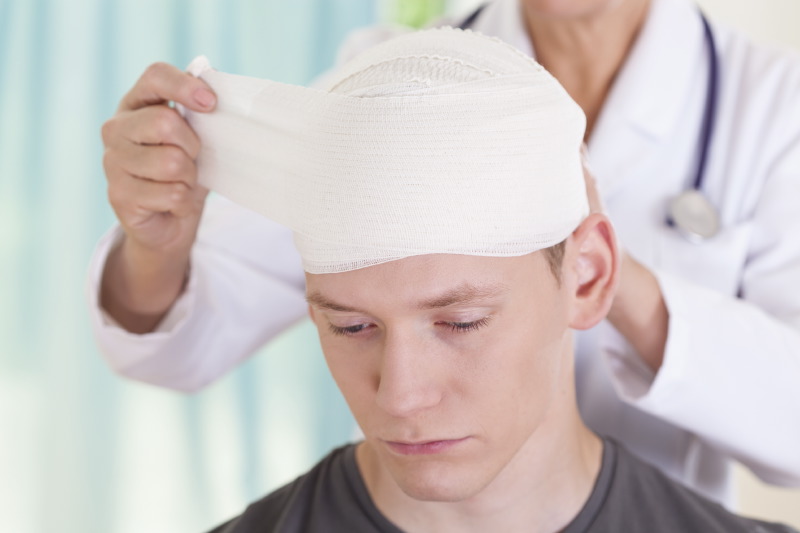
The Causes and Effects of Traumatic Brain Injuries
A traumatic brain injury (TBI) is a wide-ranging medical condition brought on by extreme force upon the skull. Causes can vary from vehicle crashes to blunt object strikes to falls and any number of other situations.
Since our brains are our most vital and sensitive organ, nearly anything that can produce a significant physical impact can be enough to create a TBI, even bumping your head really hard on the freezer door. While our skulls protect us from most incidents like these, sometimes the forces involved are so great that they are transferred inside the skull and “shake” the brain within its casing. Mild incidents are often referred to as “concussions,” but major incidents can contribute to pervasive disabilities in motor skills and cognitive function.
In other words, there are many causes of brain injuries and a wide range of effects. People who have had their skulls struck or have endured major physical forces in any way, such as in a car crash or after a bad fall, should have their brain’s status evaluated by a professional neurologist as soon as possible.
Traumatic Brain Injury Statistics
According to the CDC, TBIs are responsible for nearly a third of all injury-related deaths. Their statistics show that on average 138 people die from injuries that involve a TBI every single day. In 2010 alone, emergency departments (ED) saw 2.5 million patients where a TBI was a component in their injuries or symptoms.
Causes of Traumatic Brain Injuries
Since TBIs are a wide-ranging effect with many causes, the leading cause differs greatly between age groups. Looking once more at the CDC statistics, we can see that:
- Across all ages, falls were the leading cause of TBI at 40 percent of all cases.
- Falls affect younger and older groups disproportionately higher:
- 55 percent of TBIs for children 0-14 years old were caused by falls
- 81 percent of TBIs for adults 65 and older were fall-related
- Falls affect younger and older groups disproportionately higher:
- Blunt trauma (being struck by an object) was the second overall leading TBI cause at 15 percent of cases between 2006-2010
- Nearly a quarter of TBIs in children 15 and younger were caused by blunt trauma
- Vehicle crashes were the third most common cause across all age groups — 14 percent of cases
- Motor vehicle crashes were the second-highest cause of TBI-related death at 26 percent
- Notable victims include actor Tracy Morgan, who will take years to work professionally again because of his injuries
- Nearly 10 percent of TBIs occur from assaults, including domestic abuse
- 75 percent of assaults that result in TBI occurred in people between the ages of 15 and 44
- Domestic abuse-related TBIs in women are suspected to be at a higher rate than currently reported, largely because of issues in underreporting and missed diagnoses
- Blast-related TBIs have affected at least 230,000 soldiers serving in the Iraq and Afghanistan wars. These conditions also often go underreported because of similarities in the symptoms to PTSD (post-traumatic stress disorder).
- Sports and recreation-related injuries in children are extremely common sources of TBI, accounting for 248,418 visits in 2009 alone
Symptoms of Traumatic Brain Injury
The symptoms of traumatic brain injury can vary greatly according to the severity of the trauma and localization of brain areas that the forces impacted the most.
Symptoms include (via Mayo Clinic):
- Loss of consciousness
- Disorientation or clouded thinking
- Loss of motor skills, including dizziness or immobility in limbs
- Chronic and/or severe headaches
- Nausea
- Chronic fatigue
- Insomnia
- Ringing in ears
- Sensitivity to light or sound
- Abrupt mood changes
- Chronic depression or anxiousness
More severe TBI victims may exhibit:
- Persistent headaches
- Convulsions or seizures
- Dilated pupils
- Fluids draining from ears or nose, including clear fluids or blood
- Numbness in fingers and toes
- Slurred speech
- Unprompted aggression
- Priapism
These symptoms are often difficult to isolate as an overall condition since they can resemble other similar diseases. Therefore, anyone experiencing any of these symptoms following an injury, wreck, fall, sports injury or any sort of major impact should immediately consult a physician or qualified neurologist. Children and older adults are especially susceptible, so extra precautions should be taken for any sort of fall or head injury incident regardless of symptoms present.
A visit to one of our expert affiliate neurologists can help diagnose the extent of the condition along with recommended procedures for rehabilitation, medication or surgery as needed. Our physical therapy affiliates can also help TBI victims regain motor function or manage the pain associated with their condition. Visit our Las Vegas neurology services page to begin addressing your condition and to recover as quickly as possible from your injury.



